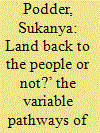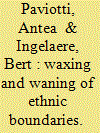|
|
|
Sort Order |
|
|
|
Items / Page
|
|
|
|
|
|
|
| Srl | Item |
| 1 |
ID:
191860


|
|
|
|
|
| Summary/Abstract |
Do South Africans hold strong populist attitudes? If so, who is the ‘populist citizen’ and have these attitudes been activated in the electoral arena? In this article, we make use of 2019 Comparative National Elections Project (CNEP) data to answer these questions. We find that populist attitudes tend to vary across levels of education, geographic location and racial groups. Given the constant supply of populist rhetoric from the Economic Freedom Fighters (EFF), we expected this party to marshal electoral support from citizens holding the strongest populist attitudes. However, we contend that the party's racialised populism and radicalism ultimately handicapped it at the ballot box. The EFF ultimately suffered from citizens’ mistrust, its lack of credibility and savvy political moves by the ANC ahead of the election.
|
|
|
|
|
|
|
|
|
|
|
|
|
|
|
|
| 2 |
ID:
191861


|
|
|
|
|
| Summary/Abstract |
Drawing on empirical research from Pujehun and Port Loko districts in Sierra Leone, this article explains the variable pathways of civic activism mobilised by environmental advocacy, and legal empowerment organisations, in response to two prominent land grabs. By grounding the analysis within the ontology of place, this study examines the dynamic interplay between national politics, global corporate interests, transnational advocacy, and civic agency in each place. The article finds that although the balance of power between these actors matters, the nature of corporate interests involved can be significant in determining the exact trajectory of civic mobilisation, and ultimately its success.
|
|
|
|
|
|
|
|
|
|
|
|
|
|
|
|
| 3 |
ID:
191856


|
|
|
|
|
| Summary/Abstract |
The destructive impacts of oil exploitation on the natural environment, which the inhabitants of the Niger Delta depend on for their livelihood, pose major threats to food security. Environmental damage alienates the local people from their ancestral lands and erodes their sources of livelihood. This study examines the effect of oil exploitation on the local people's access to sufficient, safe and culturally acceptable food. The study is based on data collected through interviews with key informants and Focus Group Discussions in the oil communities in Bayelsa, Delta and Rivers States. Environmental and livelihood sustainability are intricately interconnected. They have significant implications for food security of people in the oil-rich region. Nutritional adequacy is a necessary but not a sufficient condition for food security because cultural acceptability is also required. This study addresses the interplay between these factors and their implications for household food security in the Niger Delta.
|
|
|
|
|
|
|
|
|
|
|
|
|
|
|
|
| 4 |
ID:
191858


|
|
|
|
|
| Summary/Abstract |
In South Africa, informal rental accommodation constructed in the backyards of formal houses is the fastest growing housing segment. These backyard dwellings (BDs) are makeshift structures made from timber frames, metal sheets or wooden planks. Despite the proliferation of BDs, national and local governments have done little to improve the living standards of backyard dwellers. The research uses focus groups, interviews and building surveys to examine the current state of backyard dwellings and identify opportunities and barriers for government interventions. We analyse the barriers to home improvements, highlighting the important role of tenant dignity and landlord-tenant relations. Furthermore, the research discusses the challenges of potential government-led interventions, which could easily fail in the context of resistance, mistrust and anxiety over housing. We present four key considerations that any intervention to upgrade BDs in South Africa or similar rental units in other localities must consider.
|
|
|
|
|
|
|
|
|
|
|
|
|
|
|
|
| 5 |
ID:
191862


|
|
|
|
|
| Summary/Abstract |
As taxation has become a prominent issue on the international development policy agenda, a growing body of research has focused on taxpayer perceptions and experiences of taxation. A strand of this research emphasises the importance of the historical, political and social context of taxation. We position ourselves in line with this research as we pay attention to the emic definitions of taxation in Africa across contexts, languages, and time periods. We explore how the conception of taxation in different contexts is closely interrelated with the language used to describe it, with language being a product of histories of colonialism, conflict, and extraction by social, traditional and political actors. We argue that studies of taxation, particularly survey-based research, need to be complemented, if not informed, by a deeper understanding of the diversity of tax landscapes and of the meanings ascribed to taxation in a given context. This will strengthen content and interpretive validity of taxpayer perception data as well as provide important nuances to the understanding of the dynamics of taxpayers’ experiences of contemporary states and systems of taxation.
|
|
|
|
|
|
|
|
|
|
|
|
|
|
|
|
| 6 |
ID:
191859


|
|
|
|
|
| Summary/Abstract |
Violence based on identity constructs reinforces the experience of ethnic boundaries as felt distance between in-groups and out-groups. But what makes such an experience of rigid ethnic boundaries fade or disappear, if anything? We examined this in Burundi, a country characterised by repeated episodes of violence between Hutu and Tutsi since independence. We analysed the waxing and waning of ethnic boundaries through the (life) stories of 202 individuals collected through an iterative research process in two rural villages that were seriously touched by (ethnic) violence. Rigid boundaries between ethnic in- and out-group appeared to fade through non-violent interactions; when categorisations other than ethnic emerged; and when awareness of interstitiality, being in-between salient groups, contested the relevance and meaning of the ethnic boundary as such. These insights invite us to bring in multiple temporalities and identities when aiming to understand legacies of violence in conflict-affected societies such as Burundi. This would allow us to avoid treating groups as substantial entities, which reinforces boundaries between in-groups and out-groups.
|
|
|
|
|
|
|
|
|
|
|
|
|
|
|
|
| 7 |
ID:
191857


|
|
|
|
|
| Summary/Abstract |
This article highlights the importance of studying the politics of time in the copper and cobalt mining sector of south-eastern Democratic Republic of Congo, where a tense coexistence can be observed between artisanal and small-scale mining (ASM) and large-scale mining (LSM). It is argued that inequality in ASM-LSM settings not only manifests itself spatially but also temporally. Faced with an uncertain future, ASM and LSM actors do not have the same capacity to control time and plan their futures. Drawing on data from several rounds of ethnographic fieldwork in Katanga's mining areas between 2005 and 2022, the article advocates an approach which pays more attention to issues of time and temporality in places where large-scale forms of mineral extraction clash with small-scale ones.
|
|
|
|
|
|
|
|
|
|
|
|
|
|
|
|
|
|
|
|
|